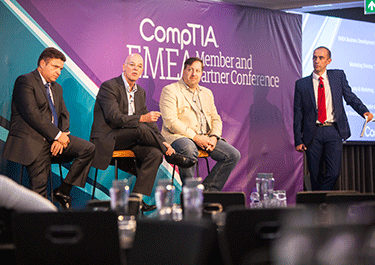 Trust underpins a successful co-selling strategy. At the CompTIA EMEA Member and Partner Conference 2017, an expert panel featuring Richard Czech, EMEA business development director, Wasabi; Andy Dow, marketing director, Tech Data UK Ltd.; Dave Sobel, senior director of community and marketing, SolarWinds MSP; and moderated by Carl West, business group director, Gfk Retail and Technology UK – explained why some companies may fear co-selling, how to build trust and why setting expectations from the outset is vital.
Trust underpins a successful co-selling strategy. At the CompTIA EMEA Member and Partner Conference 2017, an expert panel featuring Richard Czech, EMEA business development director, Wasabi; Andy Dow, marketing director, Tech Data UK Ltd.; Dave Sobel, senior director of community and marketing, SolarWinds MSP; and moderated by Carl West, business group director, Gfk Retail and Technology UK – explained why some companies may fear co-selling, how to build trust and why setting expectations from the outset is vital.
What is co-selling, and what are the main drivers?
The debate began with a definition of co-selling. Different to reselling, it was defined as the act of different companies selling the same product, together.
The panel discussed the main drivers for co-selling. Either a customer is asking for something that you can’t deliver or you want to develop a new service but don’t currently have the skill-set or resources to deliver it.
The issue of trust
The issue of trust was central to the panel debate and was cited as the main reason why projects fail. All panellists agreed that it is vitally important for each party to have a shared commitment to improving customer satisfaction. It is when there are different drivers for co-selling that the customer experience is damaged and trust is eroded.
One panellist explained that there seems to be a direct correlation between the size of a solution-provider and their willingness to trust. Levels of distrust are higher with smaller companies as they feel they have more to lose.
One panellist said he is sure that there are channel members that simply would not want, and do not trust, certain vendors to know who their end-user is. There is often an inherent distrust and concern that the partner vendor will steal a customer. On the whole, the channel tends to trust the distributor more than the vendor.
How do you foster trust?
The panel discussed the need to set clear ground rules for engagement before any co-selling occurs. This should involve working out why you want to partner and what your partner can and can’t deliver. In practical terms, this should involve a clear scope of work and a memorandum of understanding.
A panellist shared a dating analogy: When you meet a potential partner for the first time, you don’t say “let’s get married.” You have to go through the steps of getting to know one another. You must first gain a level of understanding and trust before you sign any contract. It’s the same for co-selling.
SaaS: A unique case study
Attention was paid to the challenges involved with software as a service (SaaS). The panel explained how any form of as a service, for example Device as a Service (DaaS), opens up challenges for the channel and the customer.
An example challenge is the issue of consumption and how to bring this into your business and to bill for it. There is a lot of work being done in terms of educating the salesforce and customer in consumptive usage and how third parties can help enable consumptive billing, which falls under co-selling.
The panel also discussed how the SaaS selling process is different to selling enterprise software. With SaaS, the selling continues every day. This requires a different sales skill-set – one that has to keep the customer satisfied over the long-term.
Click here to get full coverage of the EMEA Member and Partner Conference!

